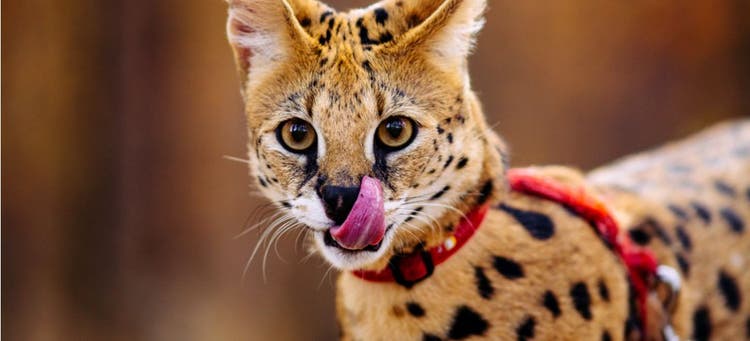
Can You Keep a Serval as a Pet?
In states where they’re legal, exotic pets can make an exciting and beautiful addition to the right home. Servals, a mid-sized African cat, are an option for residents of just under twenty U.S. states. Maybe you’ve seen them on social media.
It is legal to own a serval without obtaining a license in Alabama, Idaho, Nevada, North Carolina, South Carolina, West Virginia, and Wisconsin. Licensed exotic cat lovers can keep servals as pets in Arizona, Indiana, Maine, Mississippi, Missouri, North Dakota, Oklahoma, South Dakota, Texas, and Pennsylvania.
What Is a Serval?
Native to the African grasslands, the serval resembles a small leopard. They are prevalent south of the Sahara Desert and comparatively rare to the north. The cat lives a solitary life, only pairing to mate before mothers raise litters on their own. Both males and females live and hunt alone once they’ve reached sexual maturity. The serval’s distinctive, pointed ears provide for an impressive sense of hearing and their long limbs help them to see over tall savannah grass. With an average lifespan of more than 20 years, servals tend to live longer than their common domestic counterparts.
Risks of Keeping a Serval as a Pet
A domesticated serval cat.
There’s a reason domesticated servals aren’t legal in all 50 states. Servals are wild animals and introducing them to home life is hard and often risky work.
Servals Require Specific Habitats and Diets
Keeping a serval content and engaged may require turning your home into a veritable zoo. A serval’s natural instincts compel them to jump, climb, and explore. Providing for these needs will likely be expensive and often necessitate creating an entire outdoor enclosure. When it comes to their meals, servals can’t make do with your average store-bought cat foods. They require a specialized diet featuring a wide variety of protein and nutrient-rich meats.
Servals Are More Aggressive Than Typical Cats
While servals are perfectly capable of showing affection, it’s hardly in their nature to relax on the couch or in someone’s lap. Their bites are nearly three times stronger than those of typical cats and they love to roughhouse with their claws. While some serval owners may opt to declaw their pets to avoid injury and property damage, the procedure is both controversial and potentially dangerous to cats. Since 2019, it has been illegal as an elective procedure in the state of New York.
Servals Really Like to Mark Their Territory
In their native grasslands, servals occupy and hunt within a territory all their own. Many owners report that they don’t leave the habit of spraying urine to mark their territory behind once they’ve entered a home. Some servals won’t take to litter boxes and they are known to regularly, emphatically urinate on furniture and even their owners.
Is an Exotic Cat the Right Choice?
Servals are considered a particularly unsafe choice for homes with young children and/or other pets. Carefully reflect on your capacity to provide for the needs of such an unusual and demanding pet before bringing home a serval or any exotic cat. If you want to learn more about commonplace kitties, check out this guide to popular breeds.